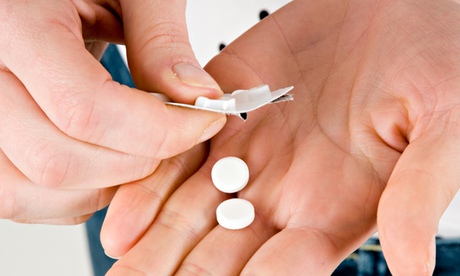
An aspirin a day can reduce the odds of getting cancers of the colon, oesophagus and stomach, according to a study published in Annals of Oncology. The researchers say the benefits would be a 45% drop in oesophageal cancer deaths, 35% in colorectal cancer deaths and a 30% drop in stomach cancer deaths.
This means that out of 1,000 men and women between the ages of 50 and 65 who took aspirin daily for 10 years, there would be 16 fewer cancer deaths and one fewer death from heart disease, although two people would die from bleeding (a side-effect of aspirin). Some doctors are mulling over whether to start taking aspirin themselves. It is cheap and over the years the evidence has mounted up to show that aspirin, once pushed as the great protector against heart disease, is actually better at preventing the onset of, and deaths from, cancer. The researchers suggest that doses from 75-325mg a day are effective. So should we be self-medicating on aspirin once we reach 50?
The solution
Well, no, we shouldn't all be taking aspirin as soon as we've celebrated a half-century. Dr Leonard Lichtenfeld, the deputy chief medical officer at the American Cancer Society, was quoted as saying the new study meant that "people should have a discussion with their doctor". GP appointments for such chats can be hard to come by, but aspirin can cause bleeding and should not be taken by under-16s or by people with asthma, stomach problems, bleeding disorders, who are pregnant, have high blood pressure, liver or kidney problems, and many other conditions. So you really need to have that chat first.
Professor Jack Cuzick, the lead author of the recent paper, is so persuasive on aspirin's benefits that I am tempted myself. The study, a review of existing evidence, is compelling but not totally clear on the criteria used to include or exclude individual studies and systematic reviews. Aspirin reduces inflammation (and so limits cells dividing and the chance of mutant, cancerous cells appearing) and may reduce the numbers of platelets (specialist clotting cells that may hide cancer cells from the immune system). Aspirin's protective effects seem to take five years to kick in and last at least five years after stopping. Studies are looking directly at whether aspirin is better than other treatments (or a placebo) in preventing cancer and reducing deaths, as well as whether it works better in certain tumours linked to abnormal genes. They will also try to work out the right dose to maximise the benefits and reduce the risk of bleeding.
If you think the evidence looks strong enough to tempt you to try daily aspirin, make sure you are over 50 and have that chat with your doctor first.

